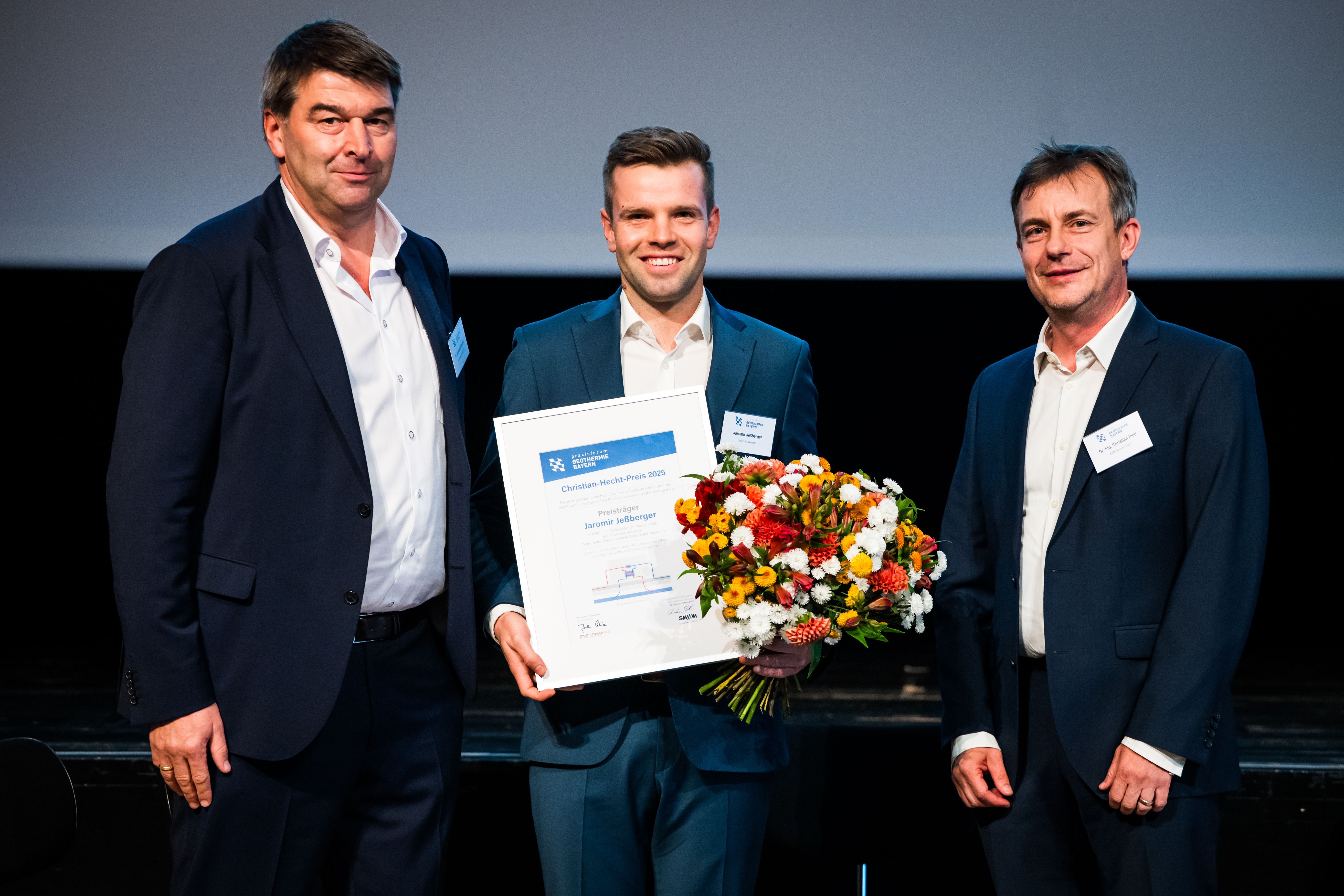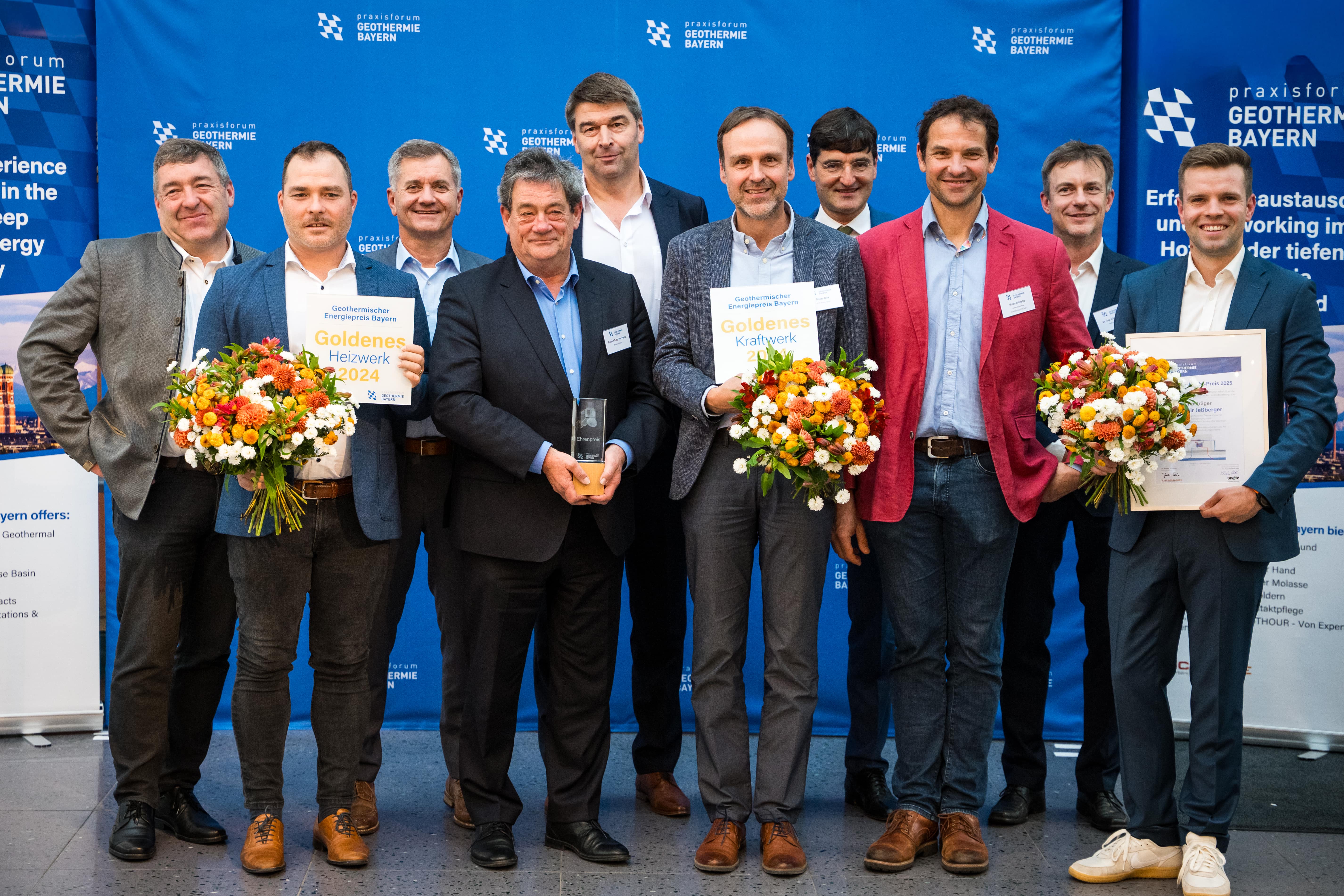Apply now for the Christian-Hecht-Award!
Your springboard into the geothermal industry
Are you researching geothermal energy? Is your thesis related to applications in the Bavarian Molasse Basin, Upper Rhine Graben or North German Basin? Are you in the final stages, or did you submit your thesis last year at the latest?
Then apply now for the Christian-Hecht-Award.
In the spirit of the geothermal pioneer and namesake Dr. Christian Hecht, we award the prize for the "best young scientist's work" of the year at our annual Praxisforum in October.

Aktueller Preisträger des Christian-Hecht-Preises 2025!
Der diesjährige Preisträger, Jaromir Jeßberger, wurde für seine Promotionsarbeit „Bewertung von Hochtemperatur-Wärmepumpen und ihre Integration in geothermische Energiesysteme" mit dem Christian-Hecht-Preis ausgezeichnet.
Im Rahmen seiner Promotion hat er ein umfassendes Konzept zur Integration von Hochtemperatur-Wärmepumpen (HTWP) in geothermische Energiesysteme entwickelt und experimentell validiert. Zunächst wurde ein Teststand für eine 35 kW-HTWP aufgebaut und deren Betriebsverhalten im Detail charakterisiert. In internationaler Zusammenarbeit mit der Ostschweizer Fachhochschule wurden Skalierungseffekte untersucht, um die Ergebnisse praxisgerecht auf industrielle Anwendungen zu übertragen. Die Forschungen zeigen, dass sich die Effizienz der Anlage durch gezielte Optimierungen wie verbesserte Rekuperation und innovative Regelungsstrategien deutlich steigern lässt.
Darauf aufbauend analysierte der Doktorand die Integration von HTWP in bestehende und mitteltiefe geothermische Heizwerke. Hierdurch konnten nicht nur die Leistungsfähigkeit und Wirtschaftlichkeit der Anlagen signifikant verbessert, sondern auch Regionen mit erneuerbarer Wärme versorgt werden, in denen bislang keine geothermischen Projekte möglich waren. Insgesamt verdeutlicht die Arbeit, dass der Einsatz von Hochtemperatur-Wärmepumpen großes Potenzial für die nachhaltige Wärmeversorgung bietet und einen wichtigen Beitrag zur Wärmewende leisten kann.
The prize
As the award winner, you will present your work to all participants of the Praxisforum. In addition to operators, planners and representatives from the drilling industry, members of the state government, future project planners, lawyers and many others will be present. In addition, your participation in the entire congress day is free, you will receive prize money and will be featured in our press releases.
Application criteria
- Master's/PhD in deep/near-surface geothermal energy with application relevance in Germany
- Reliable results
- Submission no later than the previous calendar year
- Evaluation by a panel from science & industry
Application documents
- Abstract (approx. 3,000 characters)
- CV
- Current application deadline: September 19, 2025
- Documents by e-mail to agentur [at] enerchange.de
Previous winners
2024: Chan-Neng Hsu
The award went to the master's thesis ‘Development of a workflow for the migration of a reservoir model from Petrel/Eclipse to MOOSE Framework/GOLEM using the example of a geothermal plant of Stadtwerke München (SWM)’ by Chan-Neng Hsu. It focusses on the simulation for the development of geothermal energy in the greater Munich area, using the strengths of both softwares to enable a seamless execution of the simulations.
2023: Christopher Schifflechner
The winner of the Christian Hecht Award 2023 is Christopher Schifflechner with his work on ‘Efficient and flexible geothermal systems for the joint provision of electricity, heating and cooling’. The thesis was written as part of his doctorate at the Technical University of Munich (TUM). It deals with the increasing importance of additional cooling generation through environmentally friendly and efficient sorption chillers in conjunction with deep geothermal energy, whereby new challenges in the integration into joint heating and cooling projects were identified and thermo-economically evaluated.
‘The award-winning work analyses the diverse possibilities for using geothermal heat. The work compares and optimises various operating strategies,’ said Dr Christian Pletl from Stadtwerke München in his laudatory speech.
2022: Felix Schölderle
In 2022, Felix Schölderle received the award for his work ‘Fibre-optic monitoring in a deep geothermal production well in the Upper Jurassic aquifer in southern Germany: results from standstill, under injection conditions and during production’. He completed his doctorate at the Chair of Hydrogeology at the Technical University of Munich (TUM) and his work accompanied the installation of a fibre optic cable in a deep geothermal well, which can be used to obtain extensive data.
2021: Matthäus Irl & Sebastian Eyerer
In 2021, two young scientists were recognised with the Christian Hecht Award. Matthäus Irl is a researcher at the Technical University of Munich and is working on his doctoral thesis on the analysis and optimisation of the operation of deep hydrothermal geothermal plants with electricity and heat supply. Sebastian Eyerer also completed his doctorate at the Technical University of Munich and has developed an exciting approach to improving the ORC cycle by experimentally analysing the working equipment and plant architecture.
2020: Elena Spitzmüller
In 2020, Elena Spitzmüller from KIT showed with her work ‘Thermal water treatment for raw material extraction: reduction of SiO2 concentration’ how lithium extraction in geothermal plants could be used to combine climate-friendly energy generation with electromobility. She researched innovative processes for extracting this important raw material.
2019: Florian Heine
In 2019, Florian Heine convinced the jury with his work ‘Hydro- and isotope-chemical characterisation of the Upper Jurassic thermal water reservoir in the Bavarian Molasse Basin’.
2018: Elena Mraz
In 2018, the award went to Elena Mraz for her work on reservoir characterisation to improve exploration concepts in the Upper Jurassic of the southern Bavarian Molasse Basin.
